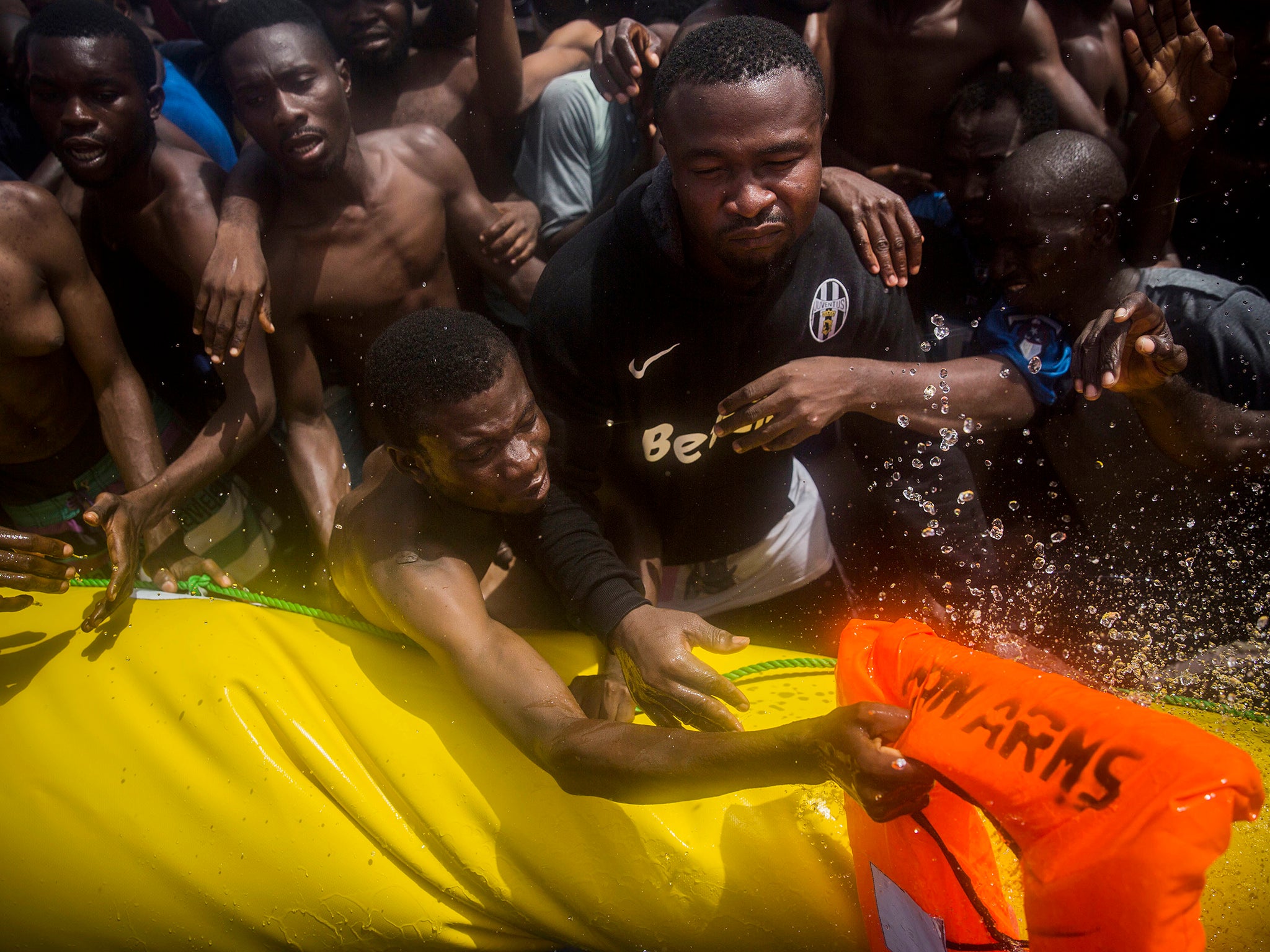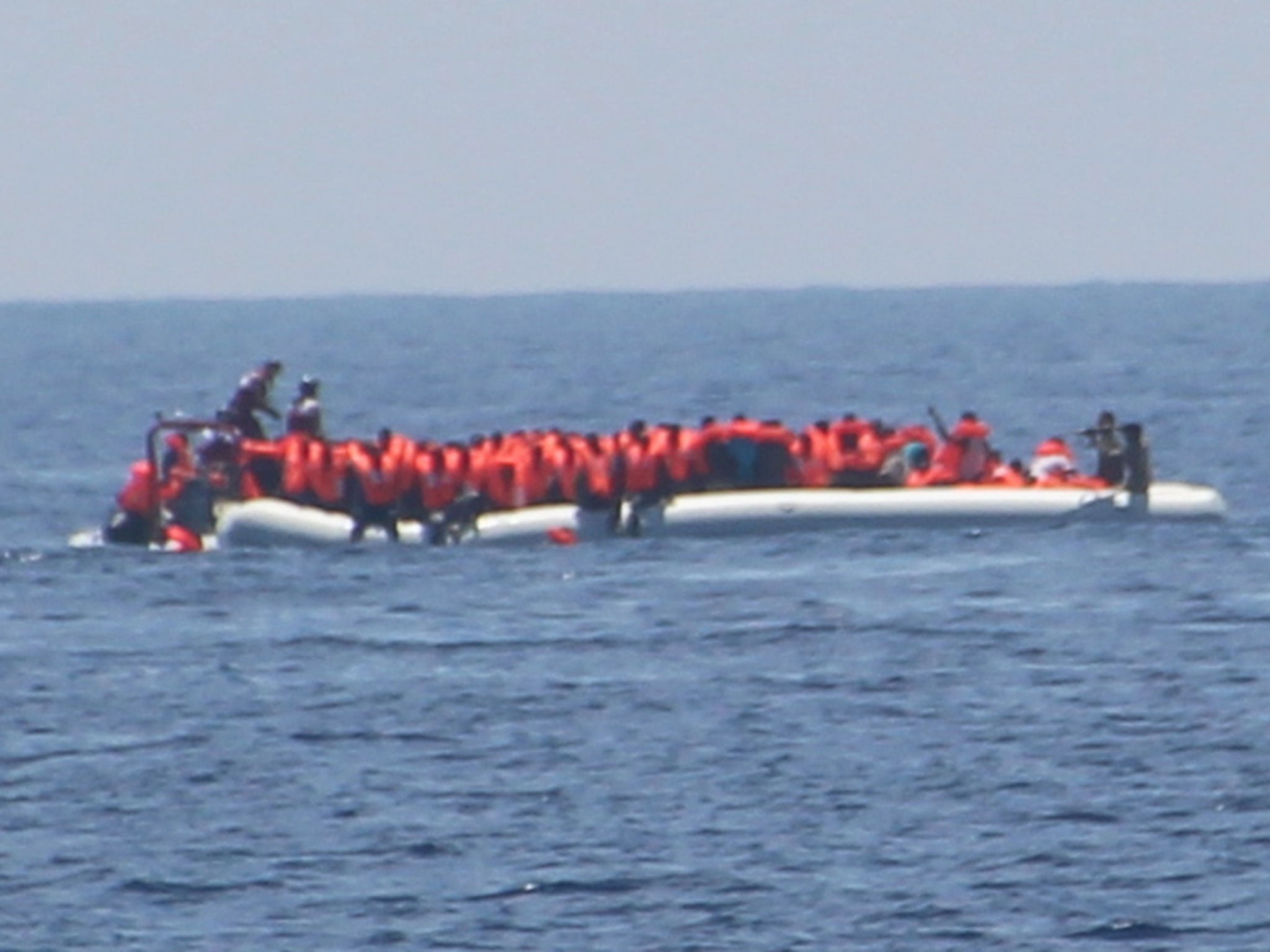EU accused of 'wilfully letting refugees drown' as NGOs face having rescues suspended in the Mediterranean
Italy could ban groups that refuse to sign up to controversial 'code of conduct' from carrying out rescues

Your support helps us to tell the story
From reproductive rights to climate change to Big Tech, The Independent is on the ground when the story is developing. Whether it's investigating the financials of Elon Musk's pro-Trump PAC or producing our latest documentary, 'The A Word', which shines a light on the American women fighting for reproductive rights, we know how important it is to parse out the facts from the messaging.
At such a critical moment in US history, we need reporters on the ground. Your donation allows us to keep sending journalists to speak to both sides of the story.
The Independent is trusted by Americans across the entire political spectrum. And unlike many other quality news outlets, we choose not to lock Americans out of our reporting and analysis with paywalls. We believe quality journalism should be available to everyone, paid for by those who can afford it.
Your support makes all the difference.Aid workers have accused the EU of “wilfully letting people drown in the Mediterranean” as they face being forced to suspend rescue missions for refugees attempting the world’s deadliest sea crossing.
Italy is attempting to impose a code of conduct on NGOs operating ships in the search and rescue zone off the coast of Libya, which is now the main launching point for migrants trying to reach Europe on smugglers’ boats.
Humanitarian groups have argued the code will impede their work by banning the transfer of refugees to larger ships, which allows vessels to continue rescues, and forcing them to allow police officers on board.
A revised code of conduct is expected to be presented by the Italian interior ministry on Monday, following meetings between officials and NGOs.
The 11-point plan, which has been approved by the European Commission and border agency Frontex, could see any groups refusing to sign up denied access to Italian ports or forbidden from carrying out rescues.
They are currently deployed by officials at Rome’s Maritime Rescue and Coordination Centre (MRCC) and charities fear any move to restrict their operations, leaving just Italian coastguard and naval ships, will dramatically reduce rescue capacity during peak season.
German charity Sea-Watch announced the deployment of a second rescue vessel in response to the plans, which it called a “desperate reaction” by a country abandoned on the frontline of the refuge crisis by its European allies.
“The EU is wilfully letting people drown in the Mediterranean by refusing to create a legal means of safe passage and failing to even provide adequate resources for maritime rescue,” said CEO Axel Grafmanns.
“The NGOs are currently bearing the brunt of the humanitarian crisis and they are being left alone.”
Médecins Sans Frontières (MSF), which has staff on two rescue ships, said it was engaging with Italian authorities in an “open and constructive way” over the proposed code but had serious concerns over several clauses.
“MSF employees are humanitarian workers, not police officers, and that for reasons of independence they will do what is strictly requested by the law but nothing more so as to protect our independence and neutrality,” a spokesperson said.
“MSF’s search and rescue operations have always been conducted in respect of national and international laws and under coordination of the MRCC in Rome.”
The charity opposed a commitment compelling vessels to notify multiple states if they leave designated search and rescue zones, which it said could cause deaths by delaying rescues, and said the ability to transfer migrants to larger ships and continue operations was “crucial to saving lives”.
“The inefficient back and forth of all rescue ships to disembarkation points will consequently lead to a decrease in the presence of rescue vessels,” a MSF spokesperson said.
The group is also seeking assurances on the scope of the requirement to allow police on board, which it said could prevent victims of torture, human trafficking and sexual violence coming forward.
Amnesty International characterised the code of conduct as part of a “concerted smear campaign” against NGO rescue ships, which has culminated in a far-right group calling itself Defend Europe sending its own vessel to “monitor” operations in the Mediterranean Sea.
Right-wing politicians have made persistent claims that aid agencies are aiding or even directly colluding with Libyan smugglers without citing evidence, despite inquiries and academic studies finding no evidence of misconduct.
The debate came as smugglers continued to launch boats into the Central Mediterranean, where almost 2,400 men, women and children have lost their lives so far this year, including 13 people found dead at the bottom of an overcrowded dinghy this week.
The EU announced €46m (£41m) extra funding for Italy on Friday, to help it protect Libya's northern and southern borders and stop the flow of sub-Sahran African migrants through the country.
Rome plans to send navy vessels to Libyan waters next month to combat human smuggling, despite warnings that moves to force refugees from international waters back to a warzone is a flagrant violation of international law.
Prime Minister Paolo Gentiloni said the initiative will “reinforce Libyan sovereignty”, adding that Italy would “not be sending a huge fleet or air squadrons.”
It is already furnishing Libya's coastguard, which stands accused of beating and killing migrants and attacking NGO ships, with boats and training aimed at strengthening its patrols.

The EU has also donated €90m (£80m) to improving living conditions for migrants stranded in squalid Libyan camps, although thousands more are being held by armed gangs who control swathes of the country still engulfed in the bloody chaos that followed its civil war.
A House of Lords report branded the EU’s Operation Sophia anti-smuggling mission a “failure” on all counts, saying it “has not in any meaningful way deterred the flow of migrants, disrupted the smugglers’ networks, or impeded the business of people smuggling”.
The committee concluded that the mission was driving refugee deaths by destroying smugglers’ boats and forcing them to switch to unseaworthy dinghies, and raised concern over reports of “serious abuses of the human rights of migrants by the Libyan coastguard”, which is being trained by the UK and equipped by the EU as it seeks to gradually unburden itself of responsibility for rescues.
The UN has warned of widespread torture, kidnap, ransom, arbitrary detention, rape, forced labour and “slave auctions” in Libya, where people smugglers have set up a lucrative business in the continuing conflict.
Refugees interviewed by The Independent have told of horrific abuses at the hands of both state security forces and Libyan gangs, including seeing other migrants being beaten to death and raped, and being “sold” between owners until they can escape over the Mediterranean.
A study commissioned by Unicef found that most children making the crossing did not intend to travel to Europe when they left home, with the journey taking up to two years.
Children interviewed in Italy said they fled their home countries for reasons including conflict, poverty and child marriage, frequently being drawn to Libya by the promise of work but finding “systematic trauma and abuse”.
Almost half of children said they were kidnapped for ransom in Libya, and a quarter held in prison without charges.
Sol Oyuela, director of public affairs at Unicef UK, said: “These devastating journeys must end and the UK Government has an opportunity to change this, by ensuring our immigration rules allow children to reunite with siblings, grandparents and other loved ones.”
More than 113,000 migrants have arrived in Europe by sea so far this year, with most of the 95,000 reaching Italy coming from countries including Bangladesh, Nigeria and other sub-Saharan African nations.
Join our commenting forum
Join thought-provoking conversations, follow other Independent readers and see their replies
Comments